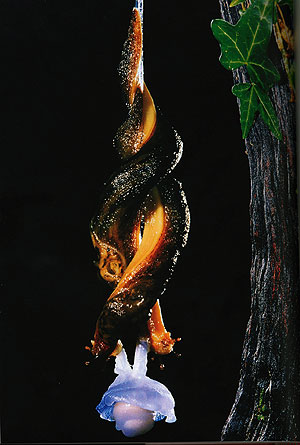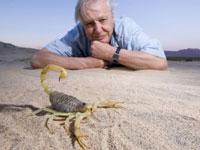
In the Alice books, Lewis Carroll presents reality as pretty boring compared to the world of imagination and dreams. The dreams, of course, may turn out to be rather nightmarish. David Attenborough makes nature documentaries which advance the thesis that the natural world is actually truly amazing if you get down and take a look at it. His latest series, Life in the Undergrowth
There is a nice book
 David Attenborough would make an excellent guide to the Zymoglyphic regions as well. He has great qualifications - he had a little museum when he was a boy, and now has huge collection of souvenirs from his travels. He is a perfect mixture of authoritativeness, enthusiasm, wonder, and a taste for the bizarre. A phrase he often uses is "and the strangest of all is this one...". He combines all that with the latest technical wizardry in closeup photography and has an engaging personal style. He is always on the scene, often windblown or out of breath, battling mosquitos to sneak up on some hapless creature. He keeps up with recent discoveries, so each series often includes some new odd animal, plant, or behavior that I have not heard about. He has covered a full range of biological and anthropological themes, and he has managed to contribute to science without having to specialize. He always has interesting ideas on the interconnectedness of things; not just describing some odd behavior, but explaining what forces have caused it to evolve that way. If he is not available for the job (as is likely), he can still serve as a role model!
David Attenborough would make an excellent guide to the Zymoglyphic regions as well. He has great qualifications - he had a little museum when he was a boy, and now has huge collection of souvenirs from his travels. He is a perfect mixture of authoritativeness, enthusiasm, wonder, and a taste for the bizarre. A phrase he often uses is "and the strangest of all is this one...". He combines all that with the latest technical wizardry in closeup photography and has an engaging personal style. He is always on the scene, often windblown or out of breath, battling mosquitos to sneak up on some hapless creature. He keeps up with recent discoveries, so each series often includes some new odd animal, plant, or behavior that I have not heard about. He has covered a full range of biological and anthropological themes, and he has managed to contribute to science without having to specialize. He always has interesting ideas on the interconnectedness of things; not just describing some odd behavior, but explaining what forces have caused it to evolve that way. If he is not available for the job (as is likely), he can still serve as a role model!
2 comments:
great post - it's interesting to view someone like attenborough through someone else's unique "lens."
there's a youtube video of the bat eating centipede you mention.
Post a Comment